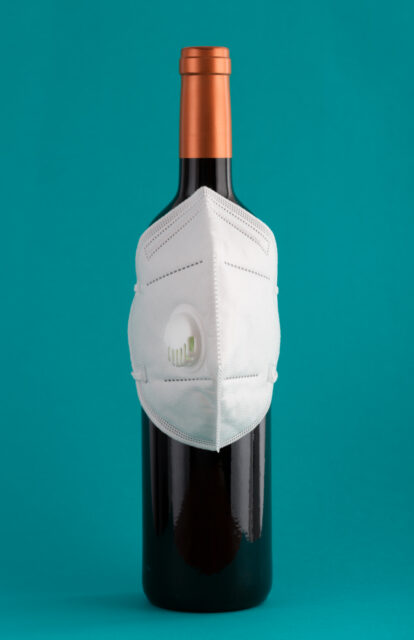This website uses cookies so that we can provide you with the best user experience possible. Cookie information is stored in your browser and performs functions such as recognising you when you return to our website and helping our team to understand which sections of the website you find most interesting and useful.
Alcohol and Covid-19: what we know
Will alcohol impair your immune response to a Covid vaccine? Can tannins in wine help fight the virus in humans? We separate the fake news from the facts when it comes to drinking and the pandemic.

Over recent weeks there have been a number of claims concerning alcohol and Covid-19, with some suggesting that drinks may have a beneficial role when it comes to fighting the virus, others a deleterious one, prompting the chair of The Wine Information Council, Dr Nicolai Worm, to lead a seminar on the most recent and newsworthy pronouncements.
Called Wine and COVID-19: fake news or facts?, the online event considered the scientific studies that could be used to support or refute claims surrounding three topics in particular: alcohol and the immune function in general; drinking and fighting Covid-19, and the impact of wine on vaccinations.
Below, db has reproduced the key findings from this insightful event, which also, as we have already said, suggested that the World Health Organisation is in fact “misleading” people when it comes to alcohol and the virus.
As you can see on the WHO website, it tells people “to avoid alcohol altogether” during the pandemic, “so that you do not undermine your own immune system” – when in fact credible scientific studies suggest that moderate wine drinking may boost immune responses to vaccinations. Furthermore, there is no correlation recorded between drinking and an increased likelihood of hospitalisation following a Covid infection.
When it comes to drawing conclusions from studies involving alcohol, Dr Nicolai Worm – who is a nutrition consultant, lecturer and professor of nutrition at the German University of Prevention and Health Care Management – said one must be careful to check two key things.
The first was whether it was an ‘in vivo’ study, as he warned that it is not possible to credibly draw conclusions on human responses from ‘in vitro’ lab-based research.
The second was whether the research differentiates between heavy and moderate drinkers.
While the latter type of drinker represents the majority of consumers, it is often the former that features in studies – and, because alcohol abuse is connected to a range of health problems, these then wrongly become associated with all levels and patterns of drinking.
See below for a three-part summary of the findings from Wine and COVID-19: fake news or facts? – which was a web-based seminar held on 2 March.
1. ALCOHOLIC BEVERAGES AND THE IMMUNE FUNCTION
- The consumption of alcoholic beverages can influence the immune system through multiple mechanisms, altering both innate and adaptive (*) immune function.
- The vast majority of research on alcohol and immune function and risk of infectious diseases is conducted on chronic heavy drinkers or people with alcohol use disorders.
- Heavy drinkers are more susceptible to pneumonia and to bacterial and viral respiratory infections.
- Binge drinking may also suppress immune response, but this response appears to be temporary.
- In comparison, very few studies have been conducted among light and moderate drinkers.
- Moderate drinking has been associated with either no risk or decreased risk of respiratory infections in some studies.
- To date there is no/insufficient evidence demonstrating an increased risk of infection associated with light or moderate drinking.
2. DOES WINE DRINKING (ALCOHOL / POLYPHENOLS) HELP FIGHT COVID-19?
- In in-vitro studies, it was shown that polyphenols (flavanols, proanthocyanidins) in grapes and wine prevented the SARS-CoV-2 virus from attaching itself to human cells. This was only one study related to SARS-CoV-2 virus and it was an in-vitro study.
- The results cannot be extrapolated to humans, and needs to be repeated in animal and human studies.
- It was shown in animal studies that the spreading of the flu virus, not the SARS-CoV-2 virus, could be prevented by blocking its enzyme.
- Some wine phenolic compounds can prevent the multiplication of the Mers-virus (another corona virus but not SARS-CoV-2 virus), by preventing attachment or invasion in the host cell.
- Some (wine) polyphenols destroy the synthesis or composition of the genetic material or the shell of viruses.
- Flavonoids in wine could stop the advancement of the flu and limit its symptoms. A possible mechanism may be that wine polyphenols influence the immune system through the gut microbiota. However, whether these mechanisms work against the Covid-19 virus in vivo in humans has not been studied/shown in appropriate studies.
3. DOES WINE CONSUMPTION MAKE COVID-19 VACCINATION INEFFECTIVE
- There is very limited research on light or moderate consumption of wine/alcoholic beverages and immune response to vaccines.
- A small number of animal and human studies have examined the effect of alcohol consumption on the immune response following vaccination – however, no studies have been published so far on alcoholic beverages and response to a Covid-19 vaccine.
- Some indication exists that moderate consumption of alcoholic beverages may assist the immune response to the vaccine, potentially through an anti-inflammatory effect of the wine polyphenols, however, there is an insufficient amount of research to form a conclusion.
Read more
WORLD HEALTH ORGANISATION ‘MISLEADING THE WORLD’ ON COVID AND ALCOHOL, CLAIMS PROFESSOR OF NUTRITION

